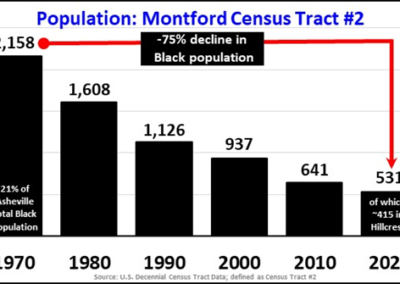In a recent piece for the Urban News, “The State of Black Asheville and Reparations,” Dr. Dwight Mullen writes:
“Jim Crow Segregation was ended by federal legislation in 1964.
The Civil Rights Act prohibited official bigotry. Local, state or national levels of authority could no longer harm or disservice citizens because of their color, religion, national origin, or sex. Schools, hospitals, courts, and businesses could no longer negatively discriminate. With the passage of the Fair Housing Act in 1968, real estate sales and rentals also could no longer legally exercise bigotry. The US Supreme Court supported the Congress by confirming the end of de jure segregation in case after case that followed.
In the 2006-07 school year at the University of North Carolina Asheville, undergraduates investigated whether the laws were, in fact, actually being obeyed. Their results were offered on campus in 2007 to the public during Black History Month. Stunningly, Education, Health Care, Criminal Justice, Economic Opportunity, and Housing were each found to have behaviors and outcomes that looked like Jim Crow never ended. It had only become invisible to official eyes.
It was not, however, invisible to the thousands of African Americans living in the City of Asheville and Buncombe County. Individuals experienced various forms of discrimination daily. And student researchers confirmed it each year for the next ten years.
Their project, The State of Black Asheville, annually reported on the outcomes by race and gender in areas that legally prohibited discrimination.”
State of Black Asheville 2021
Dr. Mullen shared recent data and analysis at an online event hosted by the Lenoir-Rhyne University Equity & Diversity Institute, “Folding Chair Speaker December 2021: Dr. Dwight Mullen & The State of Black Asheville.” You can watch a video of the presentation here:
There is mention of Montford in the video, including our map and a restrictive Montford Hills deed.
Regarding housing, in the article quoted above Dr. Mullen shares, “Housing reflects these conditions of local life. Black home ownership has declined while the stress of monthly rental payments has increased. Whites might see living in Asheville’s historically Black communities as exercises in diversity that also fit their budgets. However, the overall effects amount to a decline in the city’s Black population as gentrification and higher property taxes force Black emigration from the area.”
While the site is not updated, you can read more at stateofblackasheville.com.




